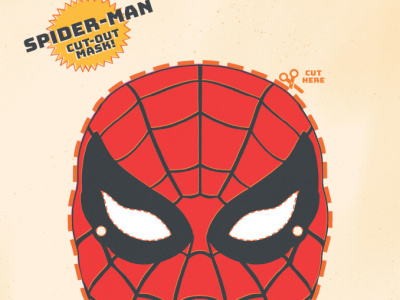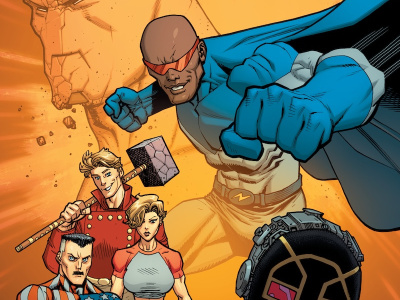Ilan Strasser of Fat Moose Comics and Games in Whippany, New Jersey sends in this Talk Back touching on the subject of all ages comics and leading into the state of the comic industry as he sees it.
What every apologist of comics with debatable content refuses to understand is that there is no way for young readers to morph into older readers in today's market. Once the kid-friendly titles become old hat for a particular child, he or she will find that even the books labeled as being for all ages have questionable conflict. Just one current example? Amazing Spider-Man #611. Even when a particular title is acceptable for all ages, there's no guarantee that the next issue will pass the same test. This is just one of the many problems the "maturing' comics industry has ignored during the past 20 years, and in doing so, comics have seen their readership decline to once again near fatal levels. At my store, I have cut my monthly orders by over 25% since February and I am still losing money every week. I have lost almost 25% of my reservists in that time as well. I'd like to say I've gotten too old for the job or that I don't know what I'm doing, etc., but I'm only 52 and I've been in business 27 years so I am likely not the culprit. It's the economy sure, but mostly, it's the do-what we-want attitude of Marvel and DC that has gotten the comic pamphlet to the brink of extinction once again. Maybe with the new technology, no one but the old-timers cares anyway. But if you do, you have to read an article written by Brian Hibbs back in the 1990's.
It's from Brian's series of columns that he wrote for Comics Retailer magazine. You can find the article in his book collection called "Tilting at Windmills." I don't have access to the article here now, but it is #36 in the book. Perhaps the good folks at ICv2 has access to the article and can print it in it's entirety for Talk Back's readership to see. I spoke to Brian yesterday and asked for his permission to let ICv2 do just that, which he graciously gave. What did Brian see, almost 20 years ago, that he thought would lead to the demise of the industry? He cites four main factors: (1) Escalating prices that far outstrip the rate of inflation, (2) the endless arrival of sagas and crossovers that readers have said they don't want anymore, (3) the lateness of books coupled with the practice of stacking deliveries (vastly uneven shipments from week to week), and (4) the constant lowering of the content bar which makes comics less and less appealing to a wider audience. Folks, these are the four main problems stripping the industry of a wider, more profitable readership TODAY and Brian was talking about these problems as they were starting and accelerating TWO DECADES AGO.
I don't know what Marvel, DC and Diamond are thinking as they see monthly orders continue to decline, but the product they are offering and how they choose to market it shows they are oblivious to what the market really wants. Anytime there is a spike in sales for a title or series, it's no longer a reflection of what retailers, let alone readers, want. It's retailers desperately hoping that they have found something that will sell consistently over time. A major overhaul is needed to save the pamphlet from extinction and it has to start with the publishers. Strict and sensible guidelines have to be put in place dealing with everything from content, pricing, marketing, writer/artist contracts and obligations (including timeliness), the overall delivery process, etc., etc., etc. But the brain trust at Marvel & DC seem content to make as little as money as possible from publishing, caring for it only to the extent that it enhances their other licensing, marketing, and entertainment ventures.
Still, I've been asking one question for a very long time, as Brian Hibbs has in all his columns--if you can fine-tune the comic publishing paradigm so that in the long term you increase your readership, sales, and revenue, why wouldn't you do it? Who knows how many more readers would still be buying comics today, and how much stronger the market would be, if the same problems we have today had been adequately dealt with in their infancy two decades ago. With the popularity of the comic book movie, and the marketing clout of the Internet, comics might have routinely been selling 200,000 copies or more of their core, iconic titles, maybe a million in some cases. I suppose that in this particular universe, we'll never know. It's ironic that death is such a prevalent theme in today's comics; the pamphlet industry is in its death throes even as we speak.
The opinions expressed in this article are solely those of the writer, and do not necessarily reflect the views of the editorial staff of ICv2.com.
'Pamphlet Industry Is in its Death Throes'
Posted by ICv2 on January 3, 2010 @ 11:00 pm CT
MORE TALK BACK
'How Would You Deal with This?'
April 15, 2024
Ralph DiBernardo of Jetpack Comics shares his frustrations on street release dates being ignored and the lack of consequences.
'We Need More Long-Term Thinking.'
November 30, 2023
In this Talk Back, Allen Berrebbi, Director of Business Development for Big Bang Comics, comments on the current state of the Direct Market and offers a couple of suggestions to help save it.
MORE COMICS
From Marvel Comics
July 29, 2025
This September, see Marvel characters in the style of old school Halloween masks in artist James Kerigan's Retro Halloween Mask variant covers.
Remastered Originals Followed by All-New Series
July 29, 2025
Capes will return with remastered versions of the long-out-of-print originals, followed by new stories in the same universe.







